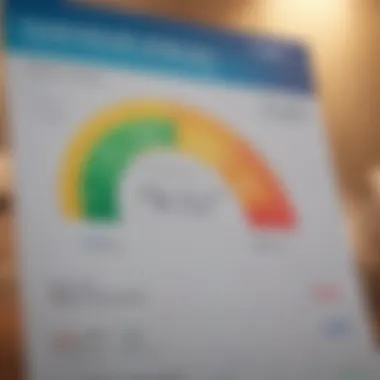Understanding Credit One Bank Approval Codes


Intro
Navigating the world of credit can feel like treading water in a murky pond. One crucial component that often eludes clarity is the approval code from Credit One Bank. This code can play a significant role in how individuals interact with credit systems, affecting everything from credit card applications to interest rates.
Understanding this code is not merely an exercise in curiosity; it can directly impact your financial health. With credit scores fluctuating like the stock market, grasping the ins and outs of approval codes becomes paramount.
In the upcoming sections, we’ll unravel the layers surrounding Credit One Bank's approval code, including what it entails, why it matters, and how you can leverage it for better credit management. This isn't just about financial jargon—it's about preparing yourself for the credit game. Let's break it down.
Prologue to Credit One Bank
When talking about personal finance and credit management, Credit One Bank holds a significant place. This bank isn't just another financial institution; it plays a vital role in helping many individuals navigate their financial journeys. From providing credit cards to enabling users to build, maintain, and improve their credit profiles, Credit One Bank is essential to an informed financial strategy.
What makes this topic crucial is not just the services offered, but how these services fit into the broader narrative of consumer finance. Understanding how Credit One Bank operates allows consumers to make informed choices in utilizing credit responsibly.
Overview of Financial Services
Credit One Bank specializes in offering a range of credit card products, particularly for those with varying credit scores. Their services cater to customers who may struggle to secure credit elsewhere.
- Credit Card Offerings: They focus on unsecured credit cards, making it easier for individuals to spend within their means without requiring collateral.
- Credit Score Tracking: Users can access tools to monitor their credit scores, an essential aspect of any individual's financial health.
- Fraud Protection Features: Safety and security when making online purchases are fundamental these days, and Credit One Bank provides features such as zero fraud liability on unauthorized transactions.
These services are not merely transactional; they offer a path to rebuilding credit scores and improving financial literacy.
Target Audience and Market Positioning
Credit One Bank primarily targets individuals who have less-than-perfect credit histories. This demographic includes:
- First-time credit users hoping to establish their credit history.
- Individuals who have experienced financial setbacks but are ready to rebuild.
- A diverse group, many of whom may be younger adults or those coming out of financial hardships.
By focusing on this audience, Credit One Bank positions itself as a supportive partner in financial recovery and growth. The bank's marketing strategies and product offerings align well with the specific needs of its customers. They understand that their users are looking for more than just credit—they're seeking tools to improve their financial well-being.
The Role of Approval Codes in Credit Applications
Understanding approval codes is akin to knowing the key to a locked door, especially in the world of credit applications. These codes serve as vital indicators within the credit assessment process, influencing how lenders perceive potential borrowers. For applicants, being schooled on what these numbers mean can make a world of difference. It’s not just a number; it’s a gateway to better terms on loans and credit cards.
Definition of Approval Codes
At its most basic level, an approval code is a signal from lenders, like Credit One Bank, indicating that a potential borrower has met certain predefined criteria during the application process. Think of it as a thumbs-up or thumbs-down, reflecting various factors such as creditworthiness and financial stability. However, these codes are not a one-size-fits-all solution. Each lender may have its own unique code, crafted from its specific algorithms and underwriting standards. Thus, understanding the nuances of these codes is critical.
The approval codes are often derived from an applicant's credit report, which provides a detailed snapshot of their financial history. This report includes credit scores, outstanding debts, payment history, and even the length of credit history. Yet, the approval code ultimately distills this complex information into a straightforward indication of approval.
Importance in the Application Process
The role of the approval code cannot be understated, especially when it comes to making an impression on lenders. Here are some reasons why understanding these codes is crucial:
- Quick Assessment: A well-defined approval code allows lenders to quickly assess the creditworthiness of an applicant. In a fast-paced financial world, speed in decision-making can tip the scales in favor of the applicant.
- Transparency: Knowing how these codes are generated can shed light on aspects of the application process that may have seemed opaque. When applicants see their approval codes, they gain insight into factors affecting their approval status.
- Negotiation Power: Armed with knowledge about their approval code, applicants might have a stronger standing while negotiating interest rates or credit limits. A solid approval code can bolster one’s case for favorable terms.
- Strategic Planning: If an applicant knows their approval code, they can work on improving it if necessary. This may lead to better financial habits, knowing there’s a tangible number guiding their credit journey.
"Your approval code isn't just a number; it's a tool for understanding your financial options better."


Overall, approval codes are not simply a procedural step; they are integral to the application process. One can view them as a map, guiding prospective borrowers toward achieving their financial goals with clearer, more accessible information. Understanding these codes can potentially mean the difference between securing favorable loan terms and being sidelined in the process.
Components of Credit One Bank's Approval Code
When trying to grasp the concept of approval codes for Credit One Bank, it’s essential to understand the various components that generate these codes. Approval codes serve as a crucial mechanism in the lending process, guiding applicants on their eligibility based on a complex interplay of factors.
Credit Score Implications
The credit score isn't just a number; it's like a report card for your financial behavior. For Credit One Bank, a favorable credit score can make the difference between receiving an approval code for your application or being left in the cold.
- A higher credit score often leads to a more favorable approval code, giving the lender confidence in your ability to repay.
- Different score ranges can categorize you differently: 300 to 579 is considered poor, 580 to 669 is fair, 670 to 739 is good, while scores above that fall into very good to excellent.
Managing your credit score should be a priority if you are looking to apply for new credit. Regularly checking your score and understanding what affects it can lead you to improve your financial profile.
Financial History Considerations
Another piece of the puzzle is your financial history, which is like an unvarnished lens into your past financial decisions. Credit One Bank examines your transaction history, loan repayment patterns, and any bankruptcies or defaults.
- If you’ve demonstrated a pattern of timely payments and responsible borrowing, you’ll find that this can significantly bolster your approval code's strength.
- Conversely, a history marred by missed payments can raise red flags. Even a few late payments can cast a long shadow over your approval chances.
Beyond what’s on your credit report, lenders also take a hard look at your overall financial behavior. It’s wise to ensure that your financial history presents you in a favorable light, particularly as you approach application season.
Current Debt and Its Impact
Current debt is like the baggage you carry on a journey. Credit One Bank evaluates how much you owe relative to your income.
- Debt-to-Income Ratio (DTI) plays a pivotal role here. A lower DTI indicates that a smaller portion of your income goes toward debt payments, making you more appealing as a borrower. Aim for a DTI below 36% for optimal chances at a favorable approval code.
- Additionally, the types of debt you carry—whether they are revolving debts like credit cards or installment loans—can influence how your approval code is perceived.
Understanding these components will not only help you navigate your way through the maze of credit applications but also lay the groundwork for a sustainable credit profile. By focusing on your credit score, refining your financial history, and minimizing your current debt load, you’ll take the necessary steps toward a favorable outcome in your credit journey.
"Ultimately, your financial choices today sculpt the credit landscape of tomorrow. Manage wisely."
By acknowledging and addressing these factors, you can tackle the approval process with greater confidence and clarity.
Understanding Your Approval Code
Understanding your approval code is crucial when navigating the financial landscape, especially for credit applicants looking to secure favorable terms. It acts as a key that opens the door to potential credit opportunities, playing a significant role in determining the conditions of your loan or credit card application. While it might seem like just a number or a vague piece of data, the approval code encapsulates much of your creditworthiness and influences various aspects of your financial future.
When you understand what your approval code signifies, it empowers you as a consumer. Here are some specific elements to consider:
- Connection to Credit Score: Your approval code is often a direct reflection of your credit score. Lenders use this code to decide the risk involved in lending you money.
- Financial History Insights: The code often encompasses your past credit behavior. A good understanding of it helps you to identify areas for improvement in your credit profile.
- Implications for Interest Rates and Limits: The approval code not only impacts your application’s odds but can play a critical role in determining your interest rates and available credit limits.
Grasping the nuances of the approval code can be quite beneficial. It's not merely a technical detail; it’s a gateway to making informed decisions regarding your credit management.
How to Retrieve Your Approval Code
Retrieving your approval code might seem challenging, but there are several straightforward ways to obtain it. Each method tends to be simple and user-friendly:


- Online Account Access: If you have an online account with Credit One Bank, log in to your account dashboard. Look for sections related to applications or account settings where your approval code may be displayed.
- Customer Service Call: Sometimes, the direct approach is the best. Call Credit One Bank’s customer service. Have your personal information handy to verify your identity, and they can retrieve the code for you.
- Documents Received: After applying for credit, review the documentation you received. Often, the approval code is included in the communication, which could be a decision letter or email confirming your application status.
- Mobile App Utility: If Credit One Bank has a mobile app, check it for features that may allow you to access your approval code directly from your smartphone.
Retrieving your approval code isn’t usually a Herculean task. Fresh opportunities can arise simply by knowing where to look.
Interpreting the Code Effectively
Having your approval code in hand is half the battle; understanding it is the other half. Without proper interpretation, the code may as well be a garbled mess of letters and numbers with no relevance to your finances. Here’s how to pull the pieces together:
- Understanding the Context: Approval codes often come in specific formats, which can vary by institution. Familiarize yourself with how Credit One Bank formats these codes; this clarity can aid in interpretation.
- Credit Score Correlation: Generally, the logic is straightforward: a higher code usually correlates with a stronger credit score. Learning about your score and how it relates to the approval code gives you view into your application standing.
- Impact Assessment: Consider what your approval code indicates regarding your financial habits. If it reflects a higher risk, analyze your credit report to pinpoint any negative factors leading to it.
- Action Steps: A good interpretation will not only inform you about where you stand but also guide you on what steps to take next, whether it’s improving your score or clearing existing debts.
“Knowledge of your approval code translates to the power to navigate your credit path more effectively.”
In essence, your approval code is not merely an indicator; it’s a versatile tool that, when well understood, enables proactive credit management.
Implications of Credit One Bank's Approval Code
Understanding the implications of Credit One Bank's approval code is crucial for anyone navigating the waters of credit applications. This approval code serves not just as a gatekeeper to your credit options, but also drives several outcomes that can significantly impact your financial future. It can influence the interest rates you may face and the credit limits assigned to you. This section digs into these elements and emphasizes the need for applicants to be well-informed about how this code works in relation to their personal finance journey.
Effect on Interest Rates
The approval code can weigh heavily on the interest rates you receive from Credit One Bank. It acts like a crystal ball for lenders, reflecting your creditworthiness based on your past financial behavior and current credit score. A stronger code often translates to lower interest rates, which is a win-win for you.
When you apply for credit, this code is a pivotal part of the risk assessment process. If your approval code indicates that you’ve managed debts wisely and maintained a respectable credit score, banks often reward you with lower rates. On the flip side, if your code indicates risk – perhaps due to high debt or past delinquencies – expect to face higher interest rates.
In practical terms, think of it this way: a lower interest rate can save you hundreds, if not thousands, of dollars over time. For instance, a $5,000 credit card balance at a 15% interest rate can accumulate considerable debt compared to a more favorable 10% rate.
"A solid approval code is not just a number; it’s your financial blessing in disguise."
This financial dynamic demonstrates why understanding your approval code is no small potatoes. It’s an essential piece of the puzzle when brainstorming your overall credit strategy.
Influence on Credit Limits
The approval code also plays a critical role in determining your credit limit with Credit One Bank. Essentially, it is one of the main criteria lenders consider when deciding how much credit to extend. A higher credit limit is advantageous as it can help improve your credit utilization ratio, a key factor in maintaining or boosting your credit score.
When your approval code indicates that you present a lower risk, a bank is more likely to assign you a higher credit limit. This scenario not only gives you more purchasing power but can also enhance your credit profile. The distinction between a $1,000 limit and a $5,000 limit might not look like much on the surface, but that extra cushion can be beneficial during emergencies.
Conversely, if your approval code suggests a higher risk, you may wind up with a lower limit. Not only can that limit restrict your purchasing power, but it could also adversely affect your credit score if you exceed a higher utilization threshold. So, while it may not seem fair that a tiny approval code can dictate your financial wingspan, it certainly emphasizes the need for responsible credit behavior.
In a nutshell, grasping the implications of your approval code is a key step in not only securing better financial terms but also in paving the way toward a robust credit profile.
Best Practices for Managing Your Credit Profile
Maintaining a sound credit profile is the backbone of any financial health strategy. For those navigating the financial waters with Credit One Bank, understanding how to effectively manage your credit profile becomes crucial.
Maintaining a Healthy Credit Score
Having a healthy credit score is not merely about meeting a number; it represents trustworthiness in the eyes of lenders. A credit score influences how much you may borrow and at what rate. Here are a few practices that will help in sustaining a good score:


- Pay Your Bills on Time: Late payments can be a dealbreaker. They stay on your credit report for several years, dragging your score down. Setting up automatic payments can ease some stress.
- Keep Credit Utilization Low: Aim to use less than 30% of your available credit. High utilization can signal to lenders that you may be overextending yourself financially.
- Regularly Monitor Your Credit Report: Everyone is entitled to a free credit report once a year from each of the three main credit bureaus. This monitorization helps catch errors that may adversely affect your score.
- Diversify Your Credit Types: Relying solely on credit cards isn’t wise. Having a mix of installment loans, revolving credit, and retail accounts can boost your score by displaying different credit behaviors.
"A strong credit score opens doors, but a weak one can slam them shut."
Strategies for Reducing Debt
Reducing debt isn’t just about trimming the budget; it’s a proactive strategy that positively shapes your credit profile. Here are some techniques for managing and reducing debt effectively:
- Create a Budget: A well-structured budget helps identify where your money is going. Allocate specific amounts to debt repayments to ensure you stay on track.
- Snowball or Avalanche Method: Decide on an approach to tackle debts. The Snowball Method focuses on paying off smaller debts first, while the Avalanche Method tackles those with the highest interest rates. Each has its benefits, and your personal preference may dictate which suits you better.
- Negotiate with Creditors: Often, creditors may be willing to work with you on payment plans or settlements. Never shy away from reaching out; this could relieve stress and help your situation markedly.
- Limit New Charges: When you're in the process of paying off debts, it's wise to resist adding new charges. This means stopping impulse purchases and only spending what you can immediately pay off.
Reducing debt and managing your credit profile is essential for securing favorable options when dealing with Credit One Bank or any financial institution. Implementing these practices can build resilience in one's financial future.
Common Issues and Challenges
The credit approval process isn't always a walk in the park; sometimes you can hit snags that complicate matters. This section uncovers common problems tied to approval codes, offering insights into managing them effectively. Understanding these challenges is vital, as it allows potential cardholders to address issues proactively, ensuring a smoother experience when dealing with Credit One Bank.
Errors in Approval Codes
Mistakes in approval codes can feel like a dagger to the heart when you're anxiously awaiting your credit card application result. These errors can stem from various sources, ranging from typos in personal information to inconsistent data held by credit bureaus. A little slip, like entering a wrong Social Security number or an address variation, could throw everything off.
When an error occurs, it can lead to an unwarranted denial of your credit application. For example, if the system finds a discrepancy in your credit report while matching it with your application details, it might automatically reject your request. That's not just frustrating; it can also impact your credit score adversely if it's not sorted quickly.
To mitigate these issues before they arise, keep accurate records and double-check your details when you apply. Regularly reviewing your credit reports from sources like Equifax or Experian can help you identify any inaccuracies that might affect your approval rating.
Disputing Incorrect Information
What do you do when errors pop up in your credit reports or within your approval code? The answer lies in disputing incorrect information. This process is crucial because even a small mistake can spiral into significant financial obstacles.
If you find that your approval code contains inaccuracies, take note of these steps:
- Gather Evidence: Collect any documents that support your claims—bank statements, emails, or other records that could clarify the matter.
- File a Dispute: Contact the credit bureau or the institution that reported the information. You can usually submit a dispute online, but a written letter that summarizes your case might carry more weight.
- Follow Up: Keep tabs on your disputes. The credit reporting agencies are obligated to investigate within a reasonable timeframe, but it’s wise to follow up if you haven't received a response.
Important: Approximately 20% of consumers find errors in their credit reports. Taking action can save you from greater headaches down the road.
Disputing incorrect information can feel daunting, but it's an essential skill in the realm of credit management. It’s about reclaiming your financial narrative and ensuring you get the credit you deserve without being sidetracked by careless mistakes.
Ending
In wrapping up our discussion on the approval code for Credit One Bank, it’s imperative to recognize just how pivotal this code can be for anyone engaging with credit options today. Ensuring you understand the nuances of this code not only empowers you but also significantly enhances your ability to navigate the labyrinthine world of credit applications. This understanding shapes the very foundation of your financial journey.
Summary of Key Points
To summarize, here are the essential takeaways from our exploration:
- Approval Codes Defined: These codes serve as a quick reference for both lenders and consumers when considering a credit application. They encapsulate a host of financial data, often reflecting an applicant's reliability.
- Effects on Credit Terms: Knowing your specific approval code can help you secure favorable interest rates and credit limits, directly influencing your financial outcomes.
- Common Obstacles: It’s also crucial to be aware of potential errors within your approval code and the steps necessary to amend any discrepancies, thus safeguarding your credit reputation.
Final Thoughts on Approval Codes
In the final analysis, comprehending the approval code issued by Credit One Bank is not merely an academic exercise; it’s a vital skill in today's economic environment. Becoming adept at interpreting these codes means more than just paperwork; it’s about taking control of your financial future. So, as you revisit your credit journey, keep the significance of these codes top of mind. They may just be the key that unlocks better financial opportunities in your life.
"Understanding your approval code can make all the difference in achieving your financial goals."
By fostering a deeper insight into these approvals, you position yourself to fully leverage the advantages available to you. This journey is less about adhering to a system and more about making informed choices that resonate with your personal fiscal aspirations.







